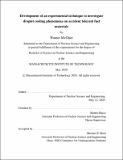Development of an experimental technique to investigate droplet cooling phenomena on accident tolerant fuel materials
Author(s)
McGhee, Warner(Warner A.)
Download1191904241-MIT.pdf (3.837Mb)
Other Contributors
Massachusetts Institute of Technology. Department of Nuclear Science and Engineering.
Advisor
Matteo Bucci.
Terms of use
Metadata
Show full item recordAbstract
Droplet cooling is used in many heat removal applications, including core spray coolers in boiling water reactors. As new accident tolerant fuels are developed, understanding how they respond to droplet cooling is important to ensuring safe operations. Recent studies have indicated that surfaces engineered with micro- and nanostructures may affect the Leidenfrost point temperature of water and thus the efficiency of droplet cooling by altering the wettability of the surfaces. In this project, smooth and rough chromium surfaces were subjected to droplet cooling at temperatures ranging from 100 to 400°C, and the surface temperature was measured with a high speed infrared camera while a video camera observed the droplet shape and behavior during boiling. While the rough and smooth surfaces performed similarly at temperatures below 200°C, the data indicates that at higher temperatures the smooth surface allows for greater heat flux, longer droplet contact time, and more total heat removed. The sparsity of data makes this result very uncertain, especially since it seems to oppose most literature on the topic. The techniques developed for this study are promising for future illumination how surface structure affects droplet cooling.
Description
Thesis: S.B., Massachusetts Institute of Technology, Department of Nuclear Science and Engineering, May, 2020 Cataloged from the official PDF of thesis. Includes bibliographical references (page 51).
Date issued
2020Department
Massachusetts Institute of Technology. Department of Nuclear Science and EngineeringPublisher
Massachusetts Institute of Technology
Keywords
Nuclear Science and Engineering.